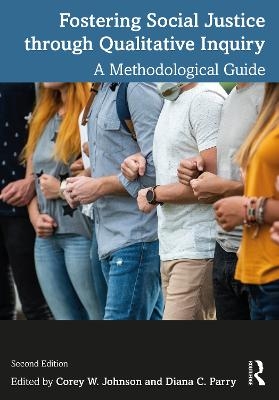
Fostering Social Justice through Qualitative Inquiry
Routledge (Verlag)
978-1-032-10691-5 (ISBN)
Contributor spotlight interviews:
Dr Kim Lopez: https://youtu.be/vEF71NM_jQc
Dr Jocelyn Scott: https://youtu.be/qfjcbgExEJ0
Dr Brian Kumm: https://www.youtube.com/watch?v=kchW0MDfw44&t=158s,
Dr Luc Cousineau: https://youtu.be/IjRvRw3WjgY
Now in its second edition, Fostering Social Justice through Qualitative Inquiry, addresses the methods of conducting qualitative research using a social justice paradigm. Qualitative researchers increasingly flock to social justice research to move beyond academic discourse and aid marginalized, oppressed, or less-powerful communities and groups.
The book addresses the differences that a social justice stance requires from the researcher, then discusses how major theories and qualitative methodologies are employed to create social justice in both the process and products of qualitative research. Snapshot theory chapters introduce the foundations of theories like feminism, critical race theory, queer theory, and many more. Robust methodological chapters cover grounded theory, phenomenology, ethnography, participatory action research, and other key qualitative designs. Chapters are written by experts in the specific theory or methodology, and exemplars of the authors work illustrate this style of research in action.
New to this edition:
• Expanded attention to the theories most commonly associated with social justice research by authors who have put it to use
• Methodological chapters on autoethnography, collective memory work, digital methods and postqualitative inquiry
• Chapter Reflection Questions to help students and their supervisors/instructors apply what they’ve learned
• Recommended readings from each author with annotations to encourage additional exploration
This established textbook will be suitable for graduate students and scholars in qualitative inquiry in a range of disciplines, including Education and Gender and Sexuality, Communication, Leisure Studies, and across the social sciences.
Corey W. Johnson is a Professor in the Department of Recreation and Leisure Studies at the University of Waterloo, Canada. He is a feminist, qualitative researcher, and scholar who focuses on power relations between dominant and non-dominant populations. Corey uses his research alongside teaching and service, engaging in advocacy, activism, civic-engagement, service-learning, and community partnerships, to create change and unique learning opportunities for individuals and institutions. He has also written the methodological text, Collective Memory Work: Learning with and from Others. Diana C. Parry is a Professor in the Department of Recreation and Leisure Studies at the University of Waterloo, Canada. She is a feminist scholar who engages in research that advocates that the personal is political while focusing on women’s health and leisure. Diana intentionally uses her research and service to advance a social justice agenda by advocating for a holistic understanding and conceptualization of health for women. She has also recently written Feminisms in Leisure Studies.
1. Contextualizing Qualitative Research for Social Justice
2. Snapshot Chapters
2.1. Marxism / Class
2.2. ‘This is what a feminist researcher looks like’: Enacting feminist theories and politics for social justice
2.3. Inquiry for Justice: Critical Race Theory and Qualitative Research
2.4. LGBT Theory/ Queer Theory
2.5. Poised Against Ableism: Critical Disability Theory (CDT), Justice, and Verbing to Disablement
2.6. Decolonization
2.7. Post-Structural Thought
2.8. Posthumanism and Social Justice Research: Skating to Freedom
3. Common Features of Qualitative Inquiry
4. Leaning into the Ambiguity of Liberation: Phenomenology for Social Justice
5. Chapter 5: Discovering Grounded Theories for Social Justice
6. One Day on Earth: Featuring Social Justice in Case Study Research
7. Ethnographic research for social justice: A critical engagement with homelessness
in a public park
8. Writing Ourselves Back into the Story: Using Autoethnography to Advance
Social Justice
9. Evocative Inquiry: Saving the World, One Story at a Time
10. Moving Forward, Looking Back: Historical Inquiry for Social Justice
11. Participatory Action Research: Democratizing Knowledge for Social Justice
12. Resurrecting Recollections: Collective Memory Work for Dismantling Discourses
of Power
13. Digital Methods for Social Justice
14. "Just Give it Up": Embracing the Immanence of Post Qualitative Inquiry
15. The Future of Social Justice: Paradigm Proliferation
| Erscheinungsdatum | 13.06.2022 |
|---|---|
| Zusatzinfo | 7 Tables, black and white; 4 Line drawings, black and white; 9 Halftones, black and white; 13 Illustrations, black and white |
| Verlagsort | London |
| Sprache | englisch |
| Maße | 178 x 254 mm |
| Gewicht | 471 g |
| Themenwelt | Sozialwissenschaften ► Pädagogik ► Sozialpädagogik |
| Sozialwissenschaften ► Soziologie ► Empirische Sozialforschung | |
| ISBN-10 | 1-032-10691-3 / 1032106913 |
| ISBN-13 | 978-1-032-10691-5 / 9781032106915 |
| Zustand | Neuware |
| Informationen gemäß Produktsicherheitsverordnung (GPSR) | |
| Haben Sie eine Frage zum Produkt? |
aus dem Bereich


